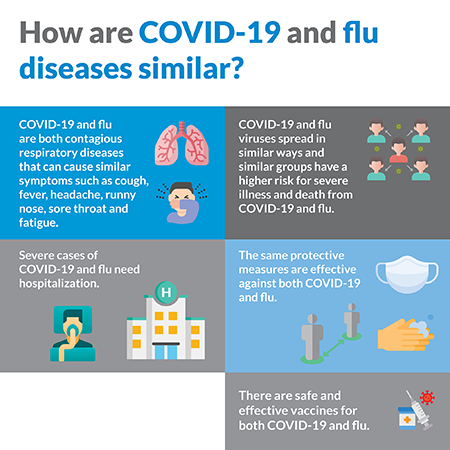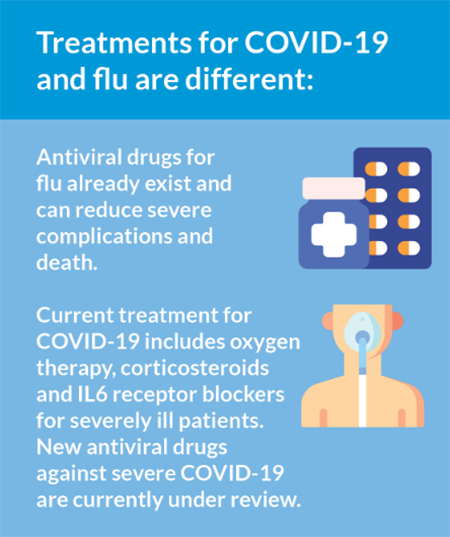Many of the influenza symptoms are similar to those that are present for COVID-19. For example, symptoms such as fever, headache, muscle ache, sneezing and coughing. For COVID-19, additionally, there are specific symptoms such as anosmia, which is a lack of smell or taste of food. Many people, especially young people, have experienced these additional and specific symptoms for COVID-19.
 The presence of these symptoms, whether they are for influenza or for COVID-19, varies in people depending on their level of immunity. It is important to note that the prevention measures, such as washing hands, wearing masks, and maintaining physical distancing are very effective for both diseases. Both seasonal influenza and COVID-19 are preventable through following these measures.
The presence of these symptoms, whether they are for influenza or for COVID-19, varies in people depending on their level of immunity. It is important to note that the prevention measures, such as washing hands, wearing masks, and maintaining physical distancing are very effective for both diseases. Both seasonal influenza and COVID-19 are preventable through following these measures.
Vaccination is effective for preventing seasonal influenza, in particular, preventing severe disease outcomes in older adults, people with serious health conditions and pregnant women. Infants may be protected by passively acquired immunity from their mother for the first 6–9 months of age. COVID-19 vaccines provide strong protection against serious illness, hospitalization and death from COVID-19. There is also some evidence that being vaccinated will make it less likely that you will pass the virus on to others, which means your decision to get the vaccine also protects those around you.
The viruses
Influenza virus is a respiratory virus that is part of the Orthomyxoviridae family. There are 4 types of seasonal influenza viruses, types A, B, C and D. Influenza A and B viruses circulate and cause seasonal epidemics of disease. They can be further broken down into subtypes depending on the combination of the proteins on their surface (e.g. influenza A) or different lineages (e.g. influenza B). Infection with influenza viruses causes influenza disease.
COVID-19 is an infectious disease caused by a respiratory virus called the severe acute respiratory syndrome coronavirus 2 (SARS-CoV-2). SARS-CoV-2 is part of the coronavirus family and can be further classified into variants and subvariants.
Signs and symptoms
 Both COVID-19 and influenza disease share similar symptoms, including cough, runny nose, sore throat, fever, headache and fatigue. People infected with either virus can have varying levels of illness; some having no symptoms, mild symptoms or severe disease. People with mild symptoms of both COVID-19 and influenza can usually be cared for safely at home. Both diseases can be fatal, with certain people at higher risk for severe disease and death.
Both COVID-19 and influenza disease share similar symptoms, including cough, runny nose, sore throat, fever, headache and fatigue. People infected with either virus can have varying levels of illness; some having no symptoms, mild symptoms or severe disease. People with mild symptoms of both COVID-19 and influenza can usually be cared for safely at home. Both diseases can be fatal, with certain people at higher risk for severe disease and death.
You cannot tell the difference between flu and COVID-19 from symptoms. Testing for the virus is the only way you can know which virus you have or reveal if someone has both influenza and COVID-19 at the same time.
Prevention
Both COVID-19 and influenza can spread from person to person, mainly in those who are in close contact with each other. Both are spread primarily by large and small particles containing virus when people with either virus cough, sneeze or talk. It is also possible to get infected by touching another person or a surface that has virus on it and then subsequently touching their own mouth, nose or eyes. Therefore, personal protective measures like:
- Regular hand washing with proper drying of the hands
- Good respiratory hygiene – Cough or sneeze into a bent elbow or tissue and throw the tissue into a closed bin
- Early self-isolation of those feeling unwell, feverish and having other symptoms of influenza
- Avoiding close contact with sick people
- Avoiding touching your eyes, nose or mouth
Can help to protect you and others from infection. Other protective measures to protect from infection also include:

- Maintain at least a 1-metre distance from others and wear a well-fitted mask
- Avoid crowded and poorly ventilated places and settings;
- Open windows or doors to keep rooms well ventilated;
In addition to these measures there are safe and effective vaccines for both COVID-19 and influenza. Vaccination is an important part of preventing severe disease and death for both COVID-19 and influenza. The vaccines for COVID-19 and influenza are not cross-protective. Influenza vaccines are different to COVID-19 vaccines so you must get both to protect yourself from each disease.
Treatment
 Different treatments are available for both influenza and COVID-19, but both in the initial stages are treated by addressing symptoms such as fever. Both viruses can cause severe disease, leading to hospitalization where more supportive treatment is needed such as a ventilator. For some patients, medications may help lessen the symptoms, severity and shorten the duration of COVID-19 or influenza illness.
Different treatments are available for both influenza and COVID-19, but both in the initial stages are treated by addressing symptoms such as fever. Both viruses can cause severe disease, leading to hospitalization where more supportive treatment is needed such as a ventilator. For some patients, medications may help lessen the symptoms, severity and shorten the duration of COVID-19 or influenza illness.
For influenza, there are oral antiviral medications available that can be used to supplement symptomatic treatment. Patients that are known to be in a group at high risk for developing severe or complicated illness should be treated with antivirals in addition to symptomatic treatment as soon as possible. Patients with severe or progressive clinical illness associated with suspected or confirmed influenza virus infection (i.e. clinical syndromes of pneumonia, sepsis or exacerbation of chronic underling diseases) should be treated with antiviral drug as soon as possible.
For COVID-19 those with milder illness, resting at home and taking medicine to reduce fever or other symptoms is usually enough. However more severe cases that require hospitalization may be treated with both novel treatments (e.g. monoclonal antibody therapy) and provided with supportive care. Optimal supportive care includes oxygen for severely ill patients and those who are at risk for severe disease and more advanced respiratory support such as ventilation for patients who are critically ill. Dexamethasone is a corticosteroid that can help reduce the length of time on a ventilator and save lives of patients with severe and critical illness. Results from the WHO’s Solidarity Trial indicated that remdesivir, hydroxychloroquine, lopinavir/ritonavir and interferon regimens appear to have little or no effect on 28-day mortality or the in-hospital course of COVID-19 among hospitalized patients. Hydroxychloroquine has not been shown to offer any benefit for treatment of COVID-19. WHO does not recommend self-medication with any medicines, including antibiotics, as a prevention or cure for COVID-19. WHO is coordinating efforts to develop treatments for COVID-19 and will continue to provide new information as it becomes available.


